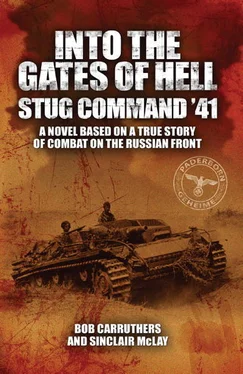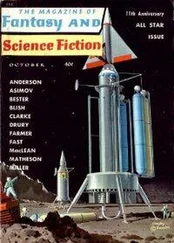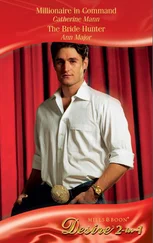With that, Korsak scuttled from behind the pile of rubble which had sheltered the two man team and sprinted to a shell-hole. Pushkin was hard on his heels and threw himself down beside him. At the same time, the loader grabbed one of the bulky shells from the rapidly diminishing supply in the ammunition box. Korsak gingerly peered over the lip of the shell-hole then swiftly withdrew as a high-explosive shell screamed towards them and exploded just three metres from their hiding place. Korsak’s cap was blown off his head by the force of the blast and earth and shell fragments rattled against Pushkin’s metal helmet. They were not to know it, but they were up against a crack marksman in Michael Knispel, and he had their range.
Inside the smoke-ridden atmosphere of the StuG, Otto Wohl selected another high-explosive round and rammed it into the breach. Never taking his eyes from the viewer for a moment, Knispel tracked his quarry, alert for the next move.
Korsak instantly realised the danger and was again first to move. His shock of white hair made him a noticeable target.
“I’ll get that white devil with the anti-tank rifle,” barked Knispel, but Korsak was again too quick for him. Once more he and Pushkin sprinted to their next position. Lying prone, Korsak took careful aim and fired just as Junge swung the StuG around to present its strongest armour. The projectile produced another jagged crack on the steel plate covering the side of the vehicle, then ricocheted skywards.
The second warning was enough for von Schroif. He was brave, but not foolhardy. There was no sense in sacrificing the vehicle for the sake of stubbornness.
“Pull back,” he ordered, “the next one could finish us. Leave it to the grenadiers to finish them off. We’ve done enough here. Tell Grunewald to bring a barrage down on them.”
Knispel sent one last round hurtling towards Korsak and Pushkin, but the shell failed to find its target and the guns swiftly withdrew, leaving the grenadiers to deal with the survivors.
Seeing the Sturmgeschütze pull back, Korsak too decided that discretion was the better part of valour and he rapidly exited the scene of the encounter which had been so fiercely contested. Knispel watched in frustration as the figure with the unmistakeable shock of white hair and disconcertingly dark eyebrows dodged from cover to cover.
“Looks like your white devil will live to fight another day,” said Junge as he watched the Soviet duo dart into the shelter of a burned-out building.
Korsak was just in time as just then all hell broke loose. With a howling surge of fury, thirty-six high-explosive warheads crashed into the former battlefield. The effect was overwhelming. The explosions, in close succession, ripped the air from the lungs of anyone in the blast area and killed by concussion. As the smoke cleared it was clear that the Nebelwerfers had succeeded in their deadly work. Nothing was left alive in the cluster of shell-holes that marked their target zone. Two kilometres away Grunewald ordered his teams to reload, but there was clearly no need for a second barrage.
The small victory wrought by Korsak and Pushkin in forcing the withdrawal of the Sturmgeschütze was the only shaft of light in an otherwise unrelenting tide of dismal events. The abortive breakout now brought the truth home. There was no prospect of escape. For the defenders of Brest-Litovsk, this could only be a slow fight to the death with no prospect of relief.
- CHAPTER 8 -
Wie eine Ratte in einer Falle
IN THE tunnels of the east fortress Karl Wendorff felt like a rat in a trap. He did not know what was worst◦— the heat, the thirst, the smells, or the persistent feeling that each moment might be his last. Furtively he looked around the brick-lined tunnel. He saw a man to his left grimacing as one of his comrades tried to dig a bullet out of his shoulder with a bayonet. Further down the line he saw a nurse in her last moments, a sheet being readied. Hed already overheard the conversation.
“We found her tied to a stake. The bastards used her for bayonet practice… and then they…” Wendorff noticed the blood smeared between her thighs and did not have to hear the rest as a blanket was laid over her.
The tunnel they were in was stifling, its red brick walls featureless. The stench from putrefying wounds was overwhelming, the heat almost unbearable. Strangely though, his own personal fear had vanished, the fear of being exposed as a soldier of the Reich, the fear of being torn limb from limb◦— perhaps justifiably so, if these men were to identify him as one of those who had inflicted this pain, this suffering and this carnage.
However, these logical thoughts were fleeting. The overriding mental preoccupation, never more than a heartbeat away, always there, always insistent, was thirst◦— choking, relentless, agonizing thirst. The combined effects of the baking sun, the airlessness, the unwashed uniforms and the heat from these packed bodies had turned the cellar into a fetid, noxious cauldron. Every part of Wendorff was soaked in sweat. “How could this be?” he wondered to himself. “Where was it coming from? When was the last time that water had passed his dry, parched throat?”
But that was a mistake. To even think of water or drinking was to open the door and invite the demons in. He couldn’t try to take his mind away from the torture. The most mundane memories would turn and torture him, memories of rain, of waterfalls, rivers and springs. “How we take things for granted!” To think that he had once complained because the weather was too wet! If he could only run in that rain now, or dive into a river or even drink from a shower!
“No, Karl, don’t think about these luxuries. Banish them from your mind. Ignore these demons. Concentrate on the here and now. Think about how you are going to get out of here without being killed or cooked alive.”
Wendorff’s brain somehow wrenched itself away from thoughts of water. “How can I get a message to von Schroif? Fire-beacons, semaphore, reflected light… smoke?” As each thought presented itself to Karl Wendorff it was instantly dismissed. Thinking about smoke signals reminded him of the American frontier novels of Karl May he had read as a child. It made him smile, but he was clever enough to know that even the most laughable of potential solutions to problems should never be dismissed offhand. In fact, in his experience, sometimes the most ridiculous suggestions provided mental starting off points which might eventually bear fruit. However none of these means of communication offered any immediate prospect of practical satisfaction◦— they were all too detectable, too imprecise. This was not to say they should be dismissed out of hand. No, he would store them on a mental shelf, ready to return to one◦— or perhaps a combination of more than one◦— if he could come up with no productive further lines of thought.
If only he had a damn radio! He had to get a message to von Schroif.
Perhaps he could build one himself◦— with what though? What about a primitive Morse transmitter? He would need a capacitor◦— and where would he find one of those? And then an inductive coil◦— ridiculous idea… “Stop thinking about it,” he told himself. “Relax. Think about something else and then it may come to you.”
As always at times like these, Karl Wendorff’s mind turned to music and to better days. He had been at his happiest in Berlin, when he got his first job at Vox Radio at number 4 Potsdamer Strasse. It was here, at Vox-Haus, that he and the other engineers had made history by working on Germany’s first broadcast station.
For some reason the schedule of that groundbreaking broadcast popped into his head. It started at 10:00 in the morning with a report about prices of all things. That was followed by a news report and then, at lunchtime, the regular stock market update. Then a time signal, then at 13:05 more news and more stock reports. And then, from 17:30 to 19:00, his favourite, music◦— often from the wonderful Berliner Funk-Kapelle. Then a language programme, often German/English, followed by a lecture from some acclaimed academic or expert. In fact, Karl Wendorff recollected with pride, he had even suggested the subject matter for one of these lectures. A broadcast about Ewald von Kleist, a German pioneer in the study of electricity, inventor of the Leyden Jar, the earliest… capacitor….
Читать дальше












